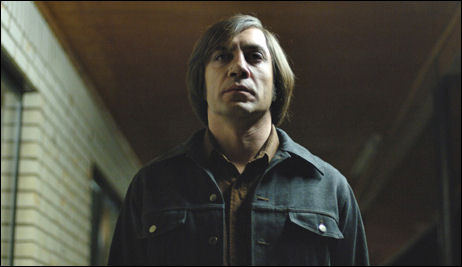When a truly exceptional film comes along, it sometimes inspires critics to do their best writing. N.Y. Post critic Lou Lumenick is expected to keep his prose plain, unadorned and borough- friendly, which means he can’t do an A.O. Scott, an Armond White or a Lisa Schwarzbaum. But his No Country for Old Men review has exceptional conviction and a pure-of-heart quality.

NCFOM “is the first movie I’ve seen in a very long while that deserves to be called a masterpiece,” he begins. “It’s such a stunning achievement in storytelling that, when the DVD comes out, I’d wager you could even turn off the sound and hardly miss a thing. This really isn’t a movie to watch on DVD, though.
“You need as big a screen as possible to savor Roger Deakins‘ sweeping cinematography, which is as integral to the movie’s triumph as the edge-of-the-seat direction by Joel and Ethan Coen, or a trio of unforgettable performances by Javier Bardem, Josh Brolin and Tommy Lee Jones.
“Adapting (and, if you ask me, surpassing) a 2005 novel by Cormac McCarthy into their best-ever movie and their first Best Picture contender since Fargo, the Coens deliver a classic, neo-noir Western of innocence lost set in 1980 Texas.
“Jones, who gets top billing but has notably less screen time than his co-stars, has never been better or a more commanding presence. Just watch when he pours himself a glass of milk from a bottle that Chigurh has left out after visiting Llewelyn’s house.
“Bardem delivers by far his most effective English-language performance as the enigmatic, deep-voiced Anton Chigurh, who plays with potential victims in memorable ways (notably a sequence at a gas station).
“The breakthrough here is Brolin, whose Llewelyn starts out as a greedy comic bumbler not unlike William H. Macy‘s Jerry Lundegaard in Fargo, but turns into a character worthy of a Greek tragedy.” Another Greek reference!
“Even in one of Hollywood’s best seasons in years, No Country for Old Menworks as high art and a rousing genre entertainment.”
That said, this passage from Armond White’s review is especially strong: “This is the Coens’ first crime movie since they began to master the medium, and the way No Country morphs from noir into contemporary-western moral struggle makes it deeper, funnier and even stranger than Fargo, their 1996 hit.
“You know what national cataclysm happened since then, so it should be no surprise that the Coens have made a crime movie that seems quietly aghast at the likelihood of death and menace occurring on American soil. Unlike American Gangster‘s sensationalized crap, this is a crime movie/western exercise that contemporizes the miasma of a world at war.”









